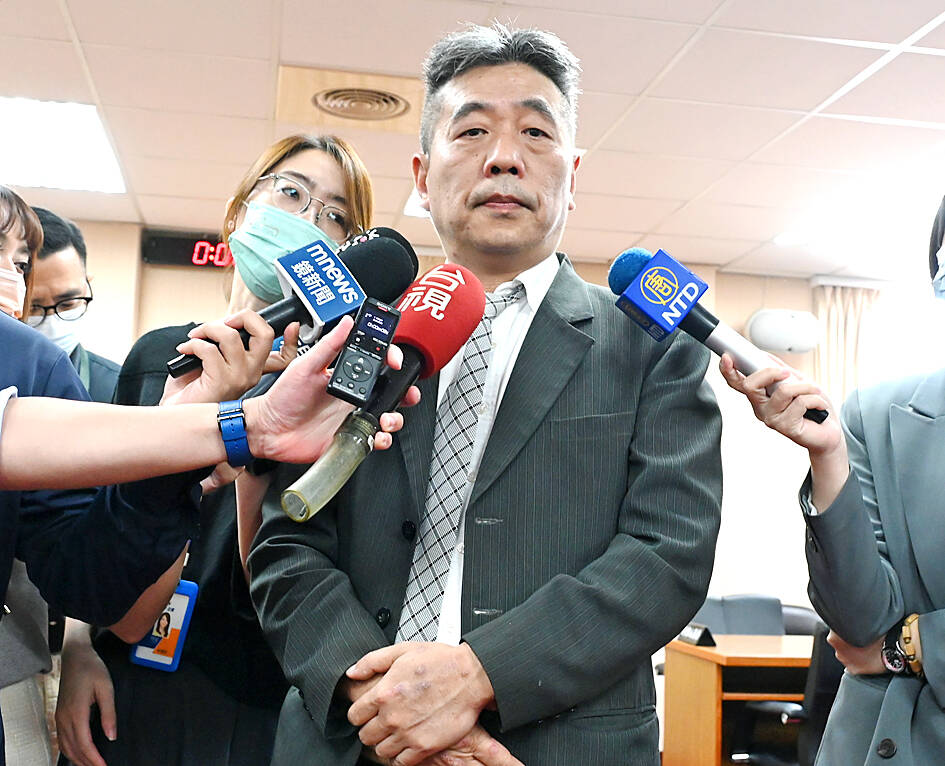The average prison sentence given to military spies in Taiwan is 18 months, significantly shorter than the 19 years given on average in other democratic nations, a defense expert said yesterday.
Democratic Progressive Party legislators yesterday convened a hearing at the legislature in Taipei on punishments given to those found guilty of espionage, and invited experts to share their opinions.
Among them was Su Tzu-yun (蘇紫雲), director of the Institute of National Defense and Security Research’s Division of Defense Strategy and Resources.

Photo: Wang Yi-sung, Taipei Times
Based on data Su compiled of notable military espionage cases, Taiwan jailed the culprits for 12.7 times shorter periods on average, compared with the 230 months seen in other democracies.
The harshest sentence was a seven-and-a-half-year prison term handed down to former army colonel Hsiang Te-en (向德恩) for corruption.
Former major Wang Hung-ju (王鴻儒) was handed a suspended nine-month prison sentence, despite being found to have attempted to develop a spy network for China, Su said.
To better deter spies, Su suggested strengthening “democratic defenses,” consolidating judicial understanding of espionage cases and reinstating military courts.
CTBC Business School Department of Business and Economic Law associate professor Chen Tsung-chien (陳重見) said there are six ways to tackle the problem.
First is a matter of the penalties being too lenient, he said.
The legislature has raised penalties significantly, but there are some types of crimes that have not yet been tackled, he said.
He also recommended taking the focus away from the National Security Act (國家安全法), as raising penalties in the National Intelligence Services Act (國家情報工作法) would apply to an entirely separate type of cases.
Additionally, judges lack proper understanding of national security issues, he said, while acknowledging that reforms undertaken by the Judicial Yuan had improved the issue.
Third, prosecutors need more tools at their disposal to investigate cases, including the use of recordings and other surveillance tools, Chen said.
Fourth, the types of crimes are not properly delineated, he said.
For instance, Hsiang could not be tried on any charges directly related to the crimes committed, leaving prosecutors with only the option of trying him for corruption, he said.
Fifth, there are few types of crimes for which a sentence can be increased, Chen said.
Finally, a specialized court should try all national security cases, not just breaches of the National Security Act, to ensure they are all treated equally, he said.
Deputy Minister of Justice Tsai Pi-chung (蔡碧仲) agreed that national security cases should be approached in a way congruous with the alleged crime.
Some people found guilty of endangering the nation have even been given suspended sentences, Tsai said.
In these cases the judges were using a general understanding of the law rather than considering the national security implications, he said, adding that it is “hard to imagine the basis for giving a suspended sentence” in those cases.
Chu Chia-chuan (朱嘉川), a judge with the Disciplinary Court of the Judicial Yuan, said that judges must rule in accordance with the law, including the presumption of innocence.
Judges are also Taiwanese and are not immune to the threats to the nation’s security, Chu said.
Chu “humbly accepted” criticism regarding lenient penalties, but said that as it involves individual trials, the Judicial Yuan cannot intervene directly.
All it can say is that the sentencing system should be refined, he said.

The inspection equipment and data transmission system for new robotic dogs that Taipei is planning to use for sidewalk patrols were developed by a Taiwanese company, the city’s New Construction Office said today, dismissing concerns that the China-made robots could pose a security risk. The city is bringing in smart robotic dogs to help with sidewalk inspections, Taipei Deputy Mayor Lee Ssu-chuan (李四川) said on Facebook. Equipped with a panoramic surveillance system, the robots would be able to automatically flag problems and easily navigate narrow sidewalks, making inspections faster and more accurate, Lee said. By collecting more accurate data, they would help Taipei

STATS: Taiwan’s average life expectancy of 80.77 years was lower than that of Japan, Singapore and South Korea, but higher than in China, Malaysia and Indonesia Taiwan’s average life expectancy last year increased to 80.77 years, but was still not back to its pre-COVID-19 pandemic peak of 81.32 years in 2020, the Ministry of the Interior said yesterday. The average life expectancy last year increased the 0.54 years from 2023, the ministry said in a statement. For men and women, the average life expectancy last year was 77.42 years and 84.30 years respectively, up 0.48 years and 0.56 years from the previous year. Taiwan’s average life expectancy peaked at 81.32 years in 2020, as the nation was relatively unaffected by the pandemic that year. The metric

TAKING STOCK: The USMC is rebuilding a once-abandoned airfield in Palau to support large-scale ground operations as China’s missile range grows, Naval News reported The US Marine Corps (USMC) is considering new sites for stockpiling equipment in the West Pacific to harden military supply chains and enhance mobility across the Indo-Pacific region, US-based Naval News reported on Saturday. The proposed sites in Palau — one of Taiwan’s diplomatic allies — and Australia would enable a “rapid standup of stored equipment within a year” of the program’s approval, the report said, citing documents published by the USMC last month. In Palau, the service is rebuilding a formerly abandoned World War II-era airfield and establishing ancillary structures to support large-scale ground operations “as China’s missile range and magazine

Passengers on Taiwan High Speed Rail (THSR) will be required to use headphones and make phone calls in gangways under new “quiet travel” rules starting Sept. 22. THSR Chairman Shih Che (史哲) told media that THSR will run a three-month promotional campaign to ensure widespread adoption of the new rules. Those repeatedly ignoring the guidance face the potential termination of their transport contract, which can result in them getting escorted off the train, according to THSR. Shih shared his hope to cultivate an environment conducive to rest and reading for the train’s passengers, stating that these changes aim to “promote self-discipline” among passengers